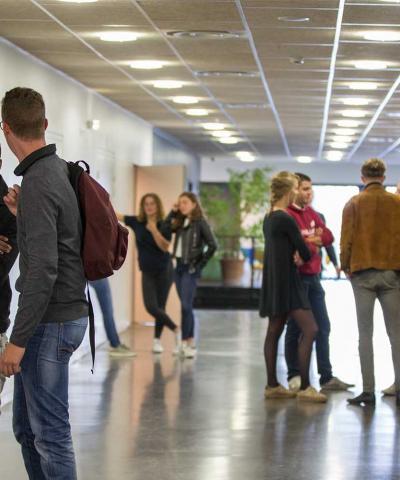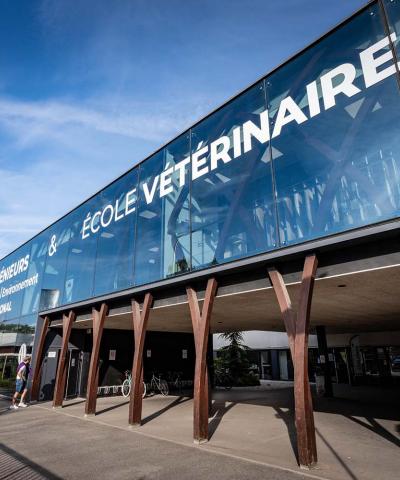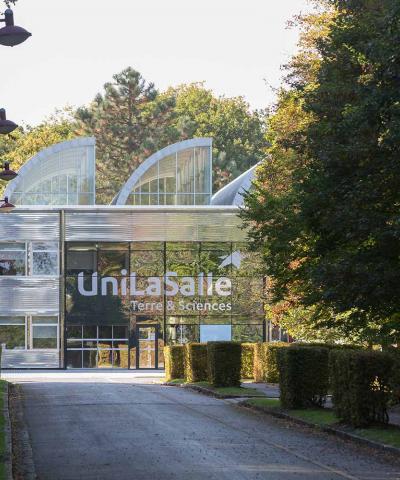Develop alternative, adaptive and creative agriculture to meet the challenges of climate change, biodiversity loss and global food insecurity.
The challenges of tomorrow's agriculture
The Farming for the future pathway provides skills for developing
- alternative agriculture: identifying the impact of agriculture on the environment, finding and providing methods and advice to implement better land use, developing new or improved technologies for livestock and/or crops, to ensure yield, quality, disease resistance, nutritional value, all using environmentally friendly methods.
- adaptive agriculture: develop sustainable solutions for agriculture, taking into account current global warming, with particular emphasis on soil management, and develop natural resource management plans, within the framework of national regulatory requirements.
- creative agriculture: designing innovative crop-livestock agrosystems for and by the world, redesigning or improving the supply chain to ensure food security.
Course details
Semester 7 - Smart and low-input agroecology
Major Smart and low-input agroecology
- Ecology and environmental issues
- Agro-ecological engineering
- AgTech and Biotech for crops and livestock productions
- Project: Sustainability evaluation – engineer project
Minors
Each semester includes 2 blocks dedicated to minors, corresponding to 54 hours of complementary teaching, enabling students to complete their training in a related field.
Several minors are offered on the Beauvais or Rennes campuses, some of which require on-site travel (others can be taken by distance learning).
Some examples of minors
Block 1: Research and development in environmental sciences / Global environmental issues / Bioeconomy and societal issues / Agroecological pest management / Innovating, undertaking and combating creaticide attitudes / Water resources, polluted sites and soils...
Block 2: Geographic information systems (GIS) / Protein biotechnologies / SME management in agribusiness / Alternative and connected agricultures / CSR focus / Water and nutrient management...
Semester 8 - Climate smart adaptative agrosystems
Major Climate smart adaptative agrosystems
- Global climate smart agriculture
- Smart and sustainable land use
- Project: Sustainability evaluation – engineer project
Minors
Each semester includes 2 blocks dedicated to minors, corresponding to 54 hours of complementary teaching, enabling students to complete their training in a related field.
Several minors are offered on the Beauvais or Rennes campuses, some of which require on-site travel (others can be taken by distance learning).
Some examples of minors
Block 1: Water management / Data mining for innovation / Energy sustainability in farms / Bioindicators for soils / Risk management in agriculture / Innovating, undertaking and combating creaticide attitudes...
Block 2: Impact of agricultural practices on the quality of processed products / Imagery analysis & remote sensing / Conservation and/or organic farming / Entomology (pests and crop auxiliaries) / Innovation, Carbon neutrality and Territories (Label Géo-bio énérgies) / Evaluating and anticipating the impacts of human activities on territories using modeling approaches...
Semester 9 - "A la carte" major
In semester 9, you can choose the path you want to follow, from :
- the main major of the Farming for the future pathway, which takes a more in-depth look at this field: Sustainable Agri-Food systems in the world (Rouen campus)
- one or more opening majors, designed to broaden your skills in another field:
- Urban agriculture and Green cities (Rouen campus)
- Ag & Food Data Management (Rouen campus)
- Territorial Development (Beauvais campus)
- Agronomic Consulting (Beauvais campus)
- Agriculture 5.0 (Beauvais campus)
- Plant Breeding (Beauvais campus)
- Agriculture and Society (Beauvais campus) I
- Intrapreneurship, entrepreneurship and innovation (Beauvais campus)
- a semester, a double degree or a degree-granting stay in France or abroad (from 12 to 18 months for a double degree or a degree-granting stay)
Semester 10 - Final internship
The final project is based on an in-company work placement or research placement for students, or on the long period spent in a company for apprentices.
A final dissertation is written and presented orally.
What careers are available after the Farming for the future course?
The Farming for the future pathway enables you to work in agronomic consulting, NGOs, crop protection, assessing the sustainability of cropping systems, and indoor and outdoor technologies.
some professions
- Environmental consultant
- International agronomic expert
- Project manager in charge of designing innovative cropping systems
- Environmental consultant
- Project manager in international development and regional planning
- R&D engineer
- Experimentation manager
- Researcher / professor




